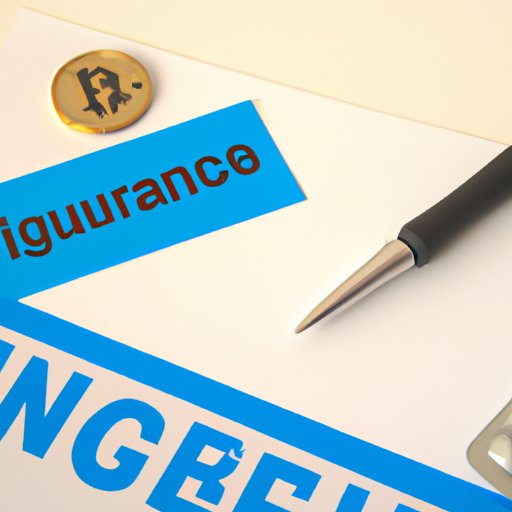Introduction
Not having health insurance is a reality for many people in the United States. Whether you’re self-employed, between jobs, or simply unable to afford coverage, not having health insurance leaves you vulnerable to unexpected medical costs. Fortunately, there are various strategies and resources available to those who don’t have health insurance.
How to Get Medical Care Without Insurance
If you don’t have health insurance, there are still ways to get the medical care you need. Here are a few options to explore:
Finding Free and Low-Cost Clinics
Free and low-cost clinics provide basic medical services such as screenings, vaccinations, and checkups at a discounted rate or even for free. These clinics are typically run by nonprofits, state and local governments, and community organizations. To find a clinic near you, you can search online or contact your local health department.
Seeking Out Discounted Services
Many hospitals, doctors’ offices, and other healthcare providers offer discounts to those who don’t have health insurance. Some may even offer sliding scale fees, meaning that you pay a percentage of the total cost based on your income level. It’s worth reaching out to potential providers to see if they offer any discounts.
Exploring Telemedicine Options
Telemedicine is an increasingly popular option for those who don’t have health insurance. It involves getting medical advice and care remotely via phone, video chat, or email. This can be a great way to get access to medical care without having to go to a doctor’s office. Many telemedicine providers offer discounted rates or sliding scale fees.

Affordable Healthcare Options for the Uninsured
If you’re looking for more comprehensive healthcare coverage, there are a few options available to those who don’t have health insurance. Here are a few to consider:
Exploring Medicaid and CHIP
Medicaid and the Children’s Health Insurance Program (CHIP) are government-funded programs that provide health insurance for eligible individuals and families. Eligibility and coverage vary from state to state, so it’s important to research the guidelines in your area. In some cases, you may be able to apply for retroactive coverage.
Looking Into Short Term Health Insurance
Short term health insurance plans are designed to provide temporary coverage for up to 12 months. These plans often include basic benefits such as doctor visits, prescription drugs, and hospitalization. However, it’s important to note that these plans usually don’t cover pre-existing conditions and have limited coverage for preventive care.
Investigating High Deductible Plans
High deductible health plans (HDHPs) are another option for those who don’t have health insurance. These plans typically require you to pay a certain amount before your insurance kicks in. While they may have higher premiums than other types of plans, they also offer lower out-of-pocket costs and may qualify you for a health savings account (HSA).
What to Do if You Can’t Afford Health Insurance
If you’re unable to afford health insurance, there are still ways to manage your medical expenses. Here are a few tips to keep in mind:
Taking Advantage of Tax Credits
The Affordable Care Act (ACA) provides tax credits for people who purchase health insurance through the marketplace. These credits are based on your income level and can help reduce the cost of premiums. It’s important to note that these credits must be claimed when you file your taxes.
Utilizing Savings Accounts
Health savings accounts (HSAs) are tax-advantaged savings accounts that allow you to save money for medical expenses. The money you contribute to an HSA can be used to pay for qualified medical expenses, including doctor visits, prescriptions, and even over-the-counter medications. It’s important to note that HSAs are only available with certain types of health insurance plans.
Enrolling in a Marketplace Plan
The Health Insurance Marketplace is a website where you can compare and purchase health insurance plans. You may be able to find a plan that fits your budget and meets your needs. It’s important to note that you may qualify for subsidies and discounts to help offset the cost of premiums.
Pros and Cons of Going Without Health Insurance
Going without health insurance comes with both advantages and disadvantages. Here’s a quick look at the pros and cons of not having health insurance:
Advantages of Not Having Insurance
The main advantage of not having health insurance is that you don’t have to pay monthly premiums. This can be especially beneficial if you’re on a tight budget or don’t expect to need much medical care. Additionally, if you’re healthy and don’t have any pre-existing conditions, you may be able to get away with not having insurance.
Disadvantages of Not Having Insurance
The biggest disadvantage of not having health insurance is that you’re likely to face high out-of-pocket costs for medical care. Even if you’re able to find free or low-cost clinics, you may still have to pay for medications and other treatments. Additionally, if you do need to be hospitalized, you could be facing thousands of dollars in medical bills.

How to Manage Health Care Costs Without Insurance
If you’re going without health insurance, it’s important to know how to manage your medical costs. Here are a few tips to keep in mind:
Making Smart Choices About Care
When you don’t have health insurance, it’s important to make smart choices about your medical care. For example, if you can avoid going to the emergency room, you may be able to save money. Additionally, you should always ask your doctor about the cost of any tests or treatments before agreeing to them.
Shopping Around for Lower Prices
It pays to shop around for medical care. Different providers may charge different prices for the same service, so it’s worth calling around to compare prices. Additionally, you should research generic versions of medications and ask your doctor if there are any cheaper alternatives.
Knowing Your Rights
It’s also important to understand your rights as an uninsured person. Federal and state laws protect the rights of those without health insurance, so it’s important to familiarize yourself with these regulations. Additionally, you should know your rights when it comes to seeking medical care in an emergency situation.
Exploring Alternatives to Traditional Health Insurance
In addition to traditional health insurance, there are other options available to those who don’t have coverage. Here are a few to consider:
Joining Health Care Sharing Ministries
Health care sharing ministries are nonprofit organizations that allow members to share medical expenses. They typically require participants to adhere to certain religious beliefs and moral standards. It’s important to note that these ministries are not technically health insurance, so they may not cover all of your medical expenses.
Investing in Critical Illness Coverage
Critical illness insurance is a type of insurance that covers the costs of serious illnesses such as cancer, heart attack, and stroke. These policies typically pay out a lump sum that can be used to cover medical bills and other expenses related to your illness. It’s important to read the fine print of any policy before signing up.
Considering Gap Insurance
Gap insurance is a type of insurance that helps cover the cost of medical care if your existing insurance doesn’t fully cover it. These policies typically have low premiums and deductibles and can be used to help pay for things like co-pays, deductibles, and other out-of-pocket expenses. It’s important to note that gap insurance is not the same as major medical insurance.

Understanding Your Rights as an Uninsured Person
It’s important to understand your rights as an uninsured person. Here are a few key points to keep in mind:
Reviewing Laws on Emergency Care
Federal and state laws protect the rights of those without health insurance, particularly in emergency situations. Under the Emergency Medical Treatment and Active Labor Act (EMTALA), hospitals are required to treat patients in an emergency regardless of their ability to pay. Additionally, most states have laws protecting the rights of those without health insurance.
Researching Anti-Discrimination Laws
The ACA prohibits healthcare providers from discriminating against those without health insurance. This includes denying care, charging different rates, or refusing to accept payment plans. It’s important to be aware of these laws and know your rights if you feel you’ve been discriminated against.
Checking State Regulations
Each state has its own regulations and requirements for those without health insurance, so it’s important to research the laws in your area. Additionally, you should familiarize yourself with any state-specific programs or resources available to those without health insurance.
Conclusion
Not having health insurance can be a daunting prospect. But with the right resources and information, you can get the medical care you need without breaking the bank. From exploring free and low-cost clinics to taking advantage of tax credits, there are plenty of options available to those without health insurance. Ultimately, it’s important to understand your rights and be aware of all the available resources.
Summary of Key Points
Not having health insurance can be a stressful situation, but there are ways to get the medical care you need without breaking the bank. Free and low-cost clinics, discounted services, and telemedicine are all viable options. Additionally, there are a variety of affordable healthcare options for the uninsured, such as Medicaid and short term health insurance. Finally, it’s important to understand your rights and take advantage of available resources.
Final Thoughts
Going without health insurance can be intimidating, but it doesn’t have to be. With the right information and resources, you can get the medical care you need without breaking the bank. It’s important to understand your rights and explore all of the available options in order to make an informed decision.
(Note: Is this article not meeting your expectations? Do you have knowledge or insights to share? Unlock new opportunities and expand your reach by joining our authors team. Click Registration to join us and share your expertise with our readers.)
